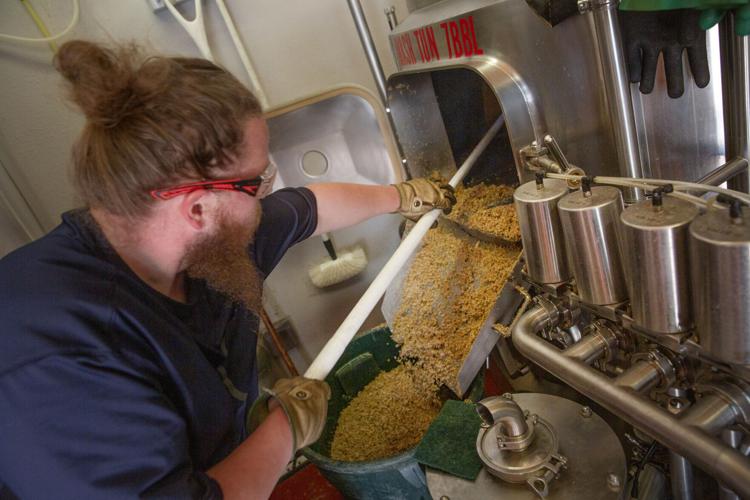Brewing beer leaves a lot leftover which Colorado small farmers are hopping on. (Video by Katie Klann)
Danny Furtado didn’t come from a family of farmers. So when he started his farm near Pueblo in 2013, he had a lot to learn.
Like what to feed his nine hens and the rooster he named Golden Boy.
Furtado heard about farmers feeding their livestock spent grain, the leftover mash from the brewing process. The few breweries in Pueblo were giving away their grain to area farms, so Furtado called up Cerberus, a Colorado Springs brewery that had recently opened at the time.
“I just went up to whoever I could find at the brewery and talked to them,” Furtado said. “Luckily, it was available.”
With that, the farmer and the brewery entered a relationship with a centuries-long tradition.
Each time Josh Adamski makes a batch of beer at Cerberus, there are three or four 30-gallon cans of spent grain that are of no use to the brewery. Spent grain, which can kind of look like mushy oatmeal, is what’s left over after the mash has extracted the sugars, proteins and nutrients, and it can constitute as much as 85 percent of a brewery’s total byproduct, according to Craftbeer.com.
Because of that, breweries have long found ways to make use of the grain. Cerberus, for example, also makes dog treats out of the spent grain to offer to customers who bring their pets to the brewery.
Handing it over to farmers is a “win-win,” said Adamski, head brewer and co-owner of Cerberus.
“You’re helping a farmer out,” he said. “And it’s saving us money.”
Furtado comes by the brewery every Monday afternoon to pick up a load of spent grain. He sometimes drops off a carton of his pasteurized eggs, too.
Adamski says most breweries have a similar system in place. In Colorado Springs, that includes Lost Friend Brewing, FH Beerworks and Goat Patch Brewing Company.
Oskar Blues started its own farm — called Hops & Heifers — in the early 2010s. Along with growing its own hops, it has used its spent grain to feed animals that eventually are slaughtered for meat to use at Oskar Blues restaurants.
Talk about full circle.
Furtado now has 150 chickens on his farm. And his animals love the spent grains along with a dry feed he buys that’s full of vitamins and minerals.
Thanks to the free grain from Cerberus, Furtado only has to buy feed every six months.
“It mainly helps supplement the cost,” Furtado said. “That means I can provide a cheaper product, which I try to do, because free range stuff isn’t cheap. It’s worth it, don’t get me wrong.”
It also helps out the brewery. The spent grain would likely just go in the trash if not for farmers.
“Why throw it in the landfill when we can use it for something?” Furtado said.











(0) comments
Welcome to the discussion.
Log In
Keep it Clean. Please avoid obscene, vulgar, lewd, racist or sexually-oriented language.
PLEASE TURN OFF YOUR CAPS LOCK.
Don't Threaten. Threats of harming another person will not be tolerated.
Be Truthful. Don't knowingly lie about anyone or anything.
Be Nice. No racism, sexism or any sort of -ism that is degrading to another person.
Be Proactive. Use the 'Report' link on each comment to let us know of abusive posts.
Share with Us. We'd love to hear eyewitness accounts, the history behind an article.